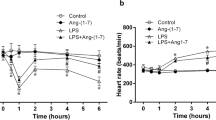Abstract.
The protective effects of a new, selective, plant-derived platelet-activating factor (PAF) antagonist, yangambin, on the cardiovascular alterations and mortality due to endotoxic shock were investigated in anaesthetized rats. We also studied the involvement of PAF in the induction of the vascular and cardiac hyporesponsiveness to adrenergic stimulation observed during endotoxaemia. The animals were sensitized to the lethal effects of Escherichia coli lipopolysaccharide (LPS) with D(+)-galactosamine (50 mg/kg, i.v.) 15 min before LPS injection. LPS (3 mg/kg, i.v.) induced a progressive and marked decrease in mean arterial blood pressure from 85±4 to 30±3 mmHg and a reduction of cardiac output (CO) from 180±7 to 37±3 ml/min (120 min) accompanied by a maintenance of systemic vascular resistance, suggesting that cardiovascular collapse resulted mainly from myocardial depression. The maximum pressor responses to noradrenaline (0.3–3.0 µg/kg, i.v.) fell from 72±9 (control) to 5±1 mmHg (LPS) while the CO responses decreased from 81±5 to 8±3 ml/min. Pre-treatment with yangambin (30 mg/kg, i.v.) or with WEB 2086 (5 mg/kg, i.v.), a reference PAF receptor antagonist, completely prevented the LPS-induced cardiovascular collapse and abolished the sharp reductions of the arterial blood pressure and CO responses to noradrenaline observed during endotoxaemia. Post-treatment with yangambin 90 min after LPS administration did not reverse the arterial hypotension, cardiac failure or cardiovascular hyporesponsiveness to catecholamines. Finally, the acute (150 min) survival rates of endotoxic shock increased from 0% (LPS group) to 100% in the groups pretreated with either yangambin or WEB 2086. The long-term (7-day) survival also increased from 0% (LPS group) to 85% (yangambin pre-treatment group). In conclusion, these data suggest a role for PAF in the pathogenesis of endotoxin-induced vascular and cardiac hyporesponsiveness to catecholamines and confirm its involvement in the complex cascade of multiple mediators released during endotoxic/septic shock. Yangambin proved to be an effective pharmacological agent against cardiovascular collapse and mortality in endotoxin shock.
Similar content being viewed by others
Author information
Authors and Affiliations
Additional information
Electronic Publication
Rights and permissions
About this article
Cite this article
Araújo, C., Barbosa-Filho, J., Cordeiro, R. et al. Protective effects of yangambin on cardiovascular hyporeactivity to catecholamines in rats with endotoxin-induced shock. Naunyn-Schmied Arch Pharmacol 363, 267–275 (2001). https://doi.org/10.1007/s002100000350
Received:
Accepted:
Issue Date:
DOI: https://doi.org/10.1007/s002100000350




